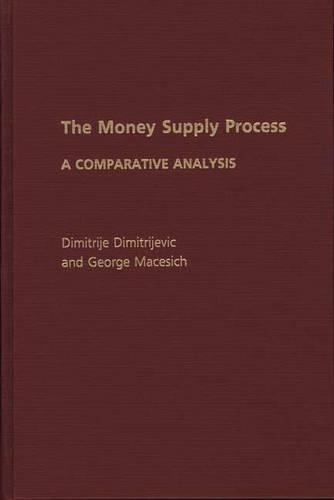
The Money Supply Process: A Comparative Analysis
(Hardback)
Publishing Details
The Money Supply Process: A Comparative Analysis
By (Author) Dimitrij Dimitrijevc
By (author) George Macesich
Bloomsbury Publishing PLC
Praeger Publishers Inc
14th February 1991
United States
Classifications
Tertiary Education
Non Fiction
International economics
332.414
Physical Properties
Hardback
192
Description
This is an international comparative, empirical study of the money supply process (MSP) that involves all of the basic types of economies and institutional economic systems at all levels of economic development. As the authors note at the outset, the highly relative nature of the MSP contributes to wide differences in the MSP in different types of economies. Yet the MSP is one of the most important topics of both monetary theory and monetary practice. The comparative approach adopted here enables the authors to explain the differences that do occur in the MSP across economies and what causes them. By properly defining the general theory and overall monetary theory of MSP, this text offers the reader both a better understanding of the national MSP and a broad framework of possibilities for improving the efficiency of monetary policy. The authors begin by describing their approach to an analysis of the MSP in national economies and the concepts and models used in this analysis. They then explain the classification of economies used in the study and their methodological approach. A separate chapter presents a comparative analysis involving 100 countries of the MSP during the 1978-83 time period. Finally, the authors look at the influence of the balance-of-payments and of domestic institutional sectors on the MSP. Their concluding chapters summarize their findings and point the way to further research in this area.
Reviews
This study provides an analysis of the monetary expansion process in various sorts of economies. The main hypothesis is that the level of development and type of economic system (capitalist or centralized) explains many of the differences in the money supply process across countries. The analysis considers 100 countries that are classified into various categories such as socialist with decentralized decision making, capitalist, etc. Allowances are also made for oil-exporting nations and levels of development. The data for the study come from the standard series provided in the International Monetary Fund's International Financial Statistics. Only three socialist countries with centralized decision making are included in the study because they are the only ones carried in the data source. Results for individual countries are not given. The various conclusions focus on the country groupings and typically concern the value of the money multiplier and reserve money creation; for instance, it is concluded that the money multipliers are higher in well-off industrial economies. Appropriate for graduate collections.-Choice
"This study provides an analysis of the monetary expansion process in various sorts of economies. The main hypothesis is that the level of development and type of economic system (capitalist or centralized) explains many of the differences in the money supply process across countries. The analysis considers 100 countries that are classified into various categories such as socialist with decentralized decision making, capitalist, etc. Allowances are also made for oil-exporting nations and levels of development. The data for the study come from the standard series provided in the International Monetary Fund's International Financial Statistics. Only three socialist countries with centralized decision making are included in the study because they are the only ones carried in the data source. Results for individual countries are not given. The various conclusions focus on the country groupings and typically concern the value of the money multiplier and reserve money creation; for instance, it is concluded that the money multipliers are higher in well-off industrial economies. Appropriate for graduate collections."-Choice
Author Bio
DIMITRIJE DIMITRIJEVIC is Professor of Economics at University of Skopje. He is formerly the General Manager of the National Bank of Yugoslavia. Among his previous books are Money in Economic Systems (Praeger, 1982), and Money and Finance in Yugoslavia: A Comparative Analysis (Praeger, 1983). GEORGE MACESICH is Professor of Economics and Director of the Center for Yugoslav-American Studies, Research, and Exchanges at Florida State University. His previous books include Monetary Policy and Rational Expectations (Praeger, 1987), and Money and Democracy (Praeger, 1990).
